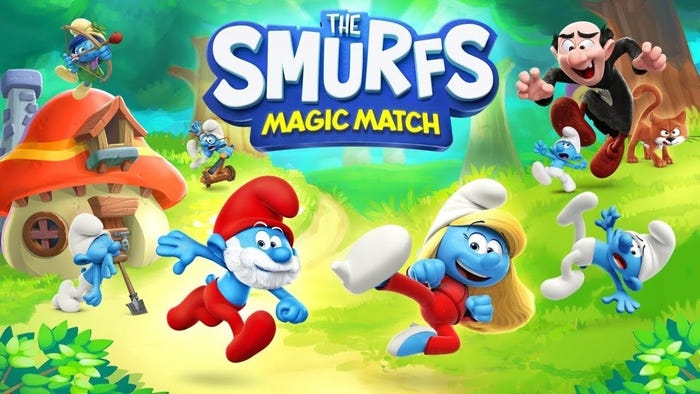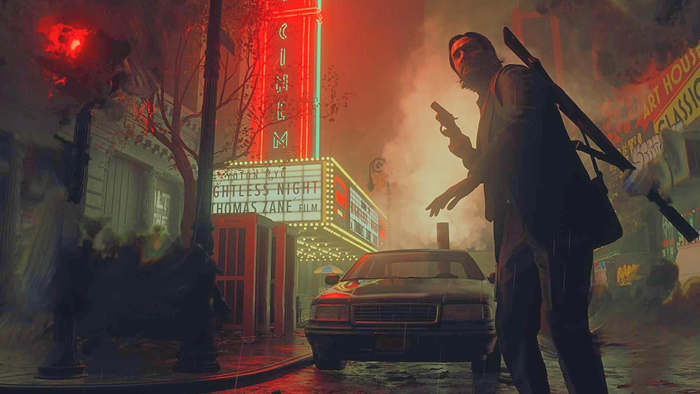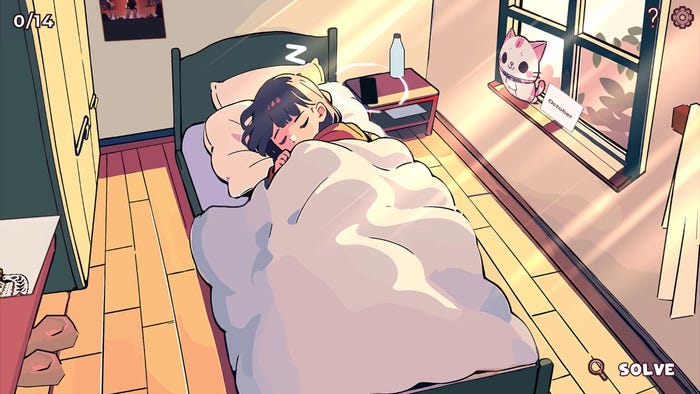
Featured Blog | This community-written post highlights the best of what the game industry has to offer. Read more like it on the Game Developer Blogs.
Emotional Connection in Video Games: Give me a reason to care.
Alex gets all emotional in this thought provoking rendering of words.

After finishing L.A Noire, I found myself confused. I love serious games as much as the next person. But after some careful thinking, and a few naps, did I come to the conclusion that I can play a game intent on playing my heart strings only if I can somehow relate to the character I'm controlling. I speak for myself, because there many people who can dive deep in bloodshed and tears, knowing full well that the protagonist is a drunk and physically abusive husband who hates black people and wishes that Nazis would stand up and fight again. I can't.
In terms of single player experiences, if a game has a theme of vengeance or retribution (which I'd say easily covers roughly 90% of games out there) I can relate to that. I can relate to hating something or someone so much that beyond a bottle of Asprin, only their painted smear on a wall can alleviate my pent up aggression towards them. Why else would we give a shit about Charles Bronson in “Death Proof” or Tom Jane in “The Punisher”? It's because we have this natural aggression, and like a cocky police force, would wish to take the law into our own hands to rid evil people from their hideouts and defaecate on their carcasses. Okay, maybe not THAT extreme, but there are people who would stay by me to behold such a sight. The breaking down of a series of events that resulted bruised bodies and egos, and a churning stomach full of Mexican food.

dantes-inferno-walkthrough-screenshot
that embrace puts a smile on my face.
Emotional experiences need to provide a sense of longing for an outcome. The player shouldn't just understand the motives of the protagonist but also understand how a want can turn to a need, and the daily grind of his or her life could, understandably, bring them to their knees in pain and torment.
If they are scared of something, like a pedophile on the block that takes children, understand what the child may think. The consequences of an action, and inability to redo things, and the mind fuck of not knowing how things end. I think of James from Silent Hill 2.

silent_screen004
Yes, you are scary.
He gets a letter from his dead wife, beckoning him to return to a place so creepy and demented, that a person named Pyramid Head lives there. Of course, he wants answers, and he knows this place doesn't welcome it's visitors with open arms and birthday balloons, But James is yearning for knowledge. He knows that in order to find the answers he's searching for, to alleviate pain and torture, the overwhelming grief and tragedy, he must bear down, putting his life on the line for a woman he used to love. Those are human emotions, embedded in us.
Next page...
The same sort of emotional experiences can reflect our perception of gaming, how we navigate through a game, and show the same developers we support and admire that they hit a “soft spot”. Portal does this to great extent, the typical nameless character a true representation of the player, and is more accurate on his or her perception of the game world due solely to a lack of response from others. The non player characters (NPC) usually order us to do something, but what's so interesting about Valve's games. It's that it's not normally a direct command, but rather a suggestion, using our player character's silence as a break in dialogue; hesitation or disgust with the current circumstances. Because the player character cannot speak his or her mind, and can only react to certain events, it makes them easier to relate to. The only thoughts that can be replicated are the players. they are the brain.
But the reality of this piece isn't just emotional impact on a character during a single player game, but actually what happens when something awful happens to a friend in a multiplayer game.
With the impending release of thatgamecompany's “Journey”, one can only imagine what kind of solitude the player will feel, traversing a barren desert, with the possibility of bumping into a complete stranger, with nothing but the use of body language to communicate with. It's quite an idea, and one that most gamers will need to adjust to, but because the concept is unique, I have to make mention a game called “Splinter Cell”. It's quite extraordinary how smaller multplayer matches can effect you on a real and personal level. Journey sports a sort of “double team” style of multiplayer. The idea of relying on one other person can actually make the experience infinitely more enjoyable then an entire “Tag team” of people.

MAG_02
I can only get to know one of you. No exceptions.
This, coming from someone who loves “Double Team” in all the Halos more than any other mode, and the obvious need to work together. In Journey, you have the ability to embark on a true adventure through a game with a complete stranger. The designer once mentioned the concept of anonymity within the game, the unknown nature of the stranger you bump into and their intention and he says few games have that sense of bonding, but I felt the same way playing Splinter Cell online. Sneaking around, breaking necks and screwing around in the darkness, it's a damned playground to experiment with. The fact that you had one other person to listen to made the game infinitely more enjoyable, and since the game had a slower pace that many of today's games, you'd feel obligated to talk to your partner. Before you know it, your squatting under a staircase with him,hiding from the Mercenaries that search for you, shooting the shit, and the game becomes the backdrop. But it's when your partner dies by gunfire or being whacked down by a mercenary that you feel shocked because you don't hear them for a good 10 or so seconds. Sadness can come over you, and at that point you realize that through near forced communication, that you've developed an emotional connection towards a complete stranger.

journey5_61610
If I see you, wave. If you don't want to talk then walk away
Then again, the majority of people I played on Splinter Cell were really cool and nice people, unlike some of the trashing talking six year old's on Halo, these people respected each other, maybe it's because the game had a more limited audience, that it doesn't have the instant gratification of other games and it takes longer to get into, but for an awesome game to have an awesome community, it's just too much.

Next page...
Emotional experiences are quite interesting because they rely on a sense of wonder. They expect players to relate to the main character on a human level, understand their plight, and some games expect us to love the girl the main character may have lost to demon overlords: and that's what's perplexing. The reason I played Mario wasn't because I was hellbent on saving the princess: that was just the minimal ingredients of a bare bones story, something to push the game along. They didn't expect us to have our hearts pounding and pupils dilated towards Princess Peach. To me, the story goes along the lines of Mario marching in from the left side of a screen, jumping over platforms and killing bad guys to get to the right side of the level. That's how I remember it. It was the gameplay that brought about emotion. It was the idea of not knowing what future levels would look and play like, and the profound tension of timing a jump right. It was Jumping on the heads of the Koopas and not in front of them. The game did it right because the actions defined the story, and that's one way the aids in my understanding of Mario. He wanted to save the princess, but as a thrill seeker, loved jumping gaps and getting into fights with reptiles. Admittedly, it helps that the story of Mario was never a strong point, therefore my expectation of an emotional connection with Mario was significantly reduced. No beating around the bush: Mario was gameplay. Moving on to a point that doesn't contradict itself...

Peach
Oh Mario, can't you find ANY other girl?
Certain games now require us to not just understand the need to get back what was lost (Shadows of the Damned) but for us to feel SOMETHING towards the love interest of the player character. Without proper character and story development, most people just understand the want, the retribution, not the underlying motive of it all. Of course, movies do this well in showing the actual death of a character's wife or child or the aftermatch with their bodies on the floor (Dante's Inferno).That evokes permissible apprehension towards the character. “Kick his ass, Sea Bass” is what friends said to Sea Bass in Dumb and Dumber, and what we said to our main character after a tragic loss of a life, especially in a game like “Dante's Inferno”.

cam-neely-seabass
L.A Noire told me to care about Cole, to feel empathetic towards the victim and the need for justice. Cole was unlikeable, and the victims and the clues to their death never made me ponder what they would be like if they were alive. The Noire genre almost REQUIRES a sensationalized death, and the impeccable mug shot of “The Man who dunnit!”. I never reached that level of a connection between Cole and the victim, the pat on the closed eyelids or a hushed whispering of “Who did this to you, Sally?” There was nothing there for me to feel for. Nothing personal.
What developers need to do is make up their minds when it comes to emotion, especially in serious games that require our understanding and cooperation. If they make me care enough to hack and slash through hell to save the girl, well, then I'll undertake said expedition, If they don't: I'll still play the game, but the subject of it's seriousness, especially when it's heavy handed with enya playing in the background, will be met with voracious yawning, rolling eyes and manic finger tapping.
Read more about:
Featured BlogsAbout the Author(s)
You May Also Like









